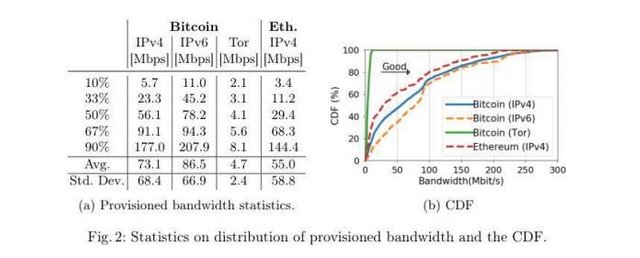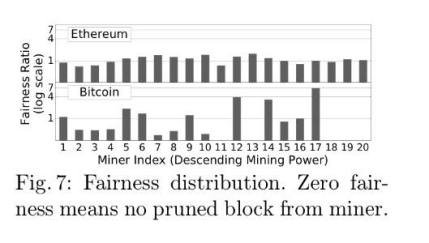
Researchers at Cornell University, using the Falcon Relay Network, have concluded that none of the two most popular cryptocurrency block chains, Bitcoin and Ethereum, are as decentralized as we thought. A two-year study claims that Bitcoin is underutilizing its network, Ethereum is better distributed than Bitcoin, and Bitcoin rewards for small miners are often unpredictable due to block size limitations.
Decentralization in Bitcoin and Ethereum Networks , a peer-reviewed study of the Cryptocurrency and Contract Initiative (IC3) at Cornell University, led by Emin Gün Sirer (Associate Professor and Co-Founder of IC3), will make some waves. Originally scheduled to be presented in February at the conference on financial cryptography and data security in Curaçao, the document was published and made available to the public on January 15, 2018.
The paper measures the actual practice of decentralization, rather than the hype to this effect, surrounding the two largest cryptocurrency networks in terms of market capitalization, Bitcoin and Ethereum. Researchers examine nodes and their interconnections, protocol requirements, and how they resist attacks, using the Falcon Relay Network (FRN) to collect data.

The FRN distributes blocks, linking minors, complete nodes by reducing orphans. In turn, the entire network is more efficient and can focus on security with the ultimate goal of helping Bitcoin grow by effectively separating block speed from network size. The hope is to level the playing field among minors and increase decentralization.
With his colleagues Adem Efe Gencer, Sumya Basu, Ittay Eyal, Robbert van Renesse, the paper studies the years 2015 to 2017, based on their position paper 2016. It seems that the bandwidth for Bitcoin nodes has increased by 1.7 times since 2016. With more bandwidth allocation, researchers say that block size can increase without impact on decentralization. And with an increase in the number per second, transactions for bitcoin should be able to almost double - a major problem for users.

If concern then turns to disk requirements, the authors point out that the costs of processors and disk space have generally been inversely reduced: lower prices and more space. They argue: "To date, we have seen no rational argument for a specific value of maximum block size in Bitcoin," stressing the "dissonance between the technicality of the arguments and the actual technical facts on the ground. "
"Compared to Ethereum, Bitcoin nodes tend to be more aggregated, both in terms of network latency than geographically," the study insists. "In other words, there are more Ethereum nodes, and they are better distributed around the world. This indicates that the complete distribution of the Ethereum nodes is much more decentralized. "Researchers attribute this to data centers with a higher percentage of Bitcoin nodes, more than half in fact. In contrast, the Ethereum data center nodes are just over a quarter.
Data centers can become troublesome in the quest for decentralization because they are often owned by companies. The number of nodes can also contribute to distort public opinion through so-called Sybil attacks. Sybil's attacks can influence the influence in a peer-to-peer system, suggesting that there is more consensus than reality. These are real concerns for consensus networks like Bitcoin.
The study found in both Ethereum and Bitcoin that mining was highly centralized, with the first four Bitcoin miners and the first three Ethereum miners controlling more than 50% of the hash rate. " indeed, the "entire blockchain for both systems are determined by fewer than 20 mining entities." Finally, "mining rewards are more unpredictable for smaller Bitcoin miners" compared to Ethereum. "This is partly due to the fact that the high rate of Ethereum offers many more opportunities for the laws of large numbers applied to Ethereum, while Bitcoin, with its infrequent blocks, can show much more uncertainty of months. month. "

Your Post Has Been Featured on @Resteemable!
Feature any Steemit post using resteemit.com!
How It Works:
1. Take Any Steemit URL
2. Erase
https://3. Type
reGet Featured Instantly – Featured Posts are voted every 2.4hrs
Join the Curation Team Here
Downvoting a post can decrease pending rewards and make it less visible. Common reasons:
Submit
You're so nice for commenting on this post. For that, I gave you a vote!
Downvoting a post can decrease pending rewards and make it less visible. Common reasons:
Submit
@OriginalWorks
Downvoting a post can decrease pending rewards and make it less visible. Common reasons:
Submit
They say EOS will be more decentralized. But I don't want to speculate on a platform that doesn't exist yet.
Downvoting a post can decrease pending rewards and make it less visible. Common reasons:
Submit
This post has received a 0.63 % upvote from @drotto thanks to: @tighilt.
Downvoting a post can decrease pending rewards and make it less visible. Common reasons:
Submit